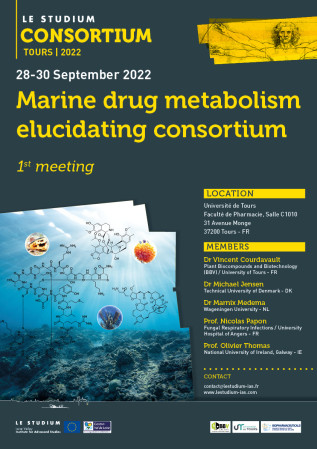Marine drug metabolism elucidating consortium
1st meeting
Faculté de Pharmacie, Salle C1010
31 Avenue Monge
Université de Tours
37200 Tours
France
Presentation
MEMBERS
- Dr Vincent Courdavault,
Plant Biocompounds and Biotechnology (BBV) / University of Tours – FR - Dr Michael Jensen,
Technical University of Denmark – DK - Dr Marnix Medema,
Wageningen University – NL - Prof. Nicolas Papon,
Fungal Respiratory Infections / University Hospital of Angers – FR - Prof. Olivier Thomas,
National University of Ireland, Galway - IE
Description
Marine organisms represent a particularly vast source of natural products of interest to humans. A number of marine natural products (MNPs) have enormous biomedical potential.
Like any other specialised metabolite, MNPs are accumulated in small or very small quantities in the organisms that produce them, and their structural complexity makes their chemical synthesis on a large scale difficult or impossible. As a result, the supply of MNPs is mainly based on the exploitation of natural resources or hemisynthetic processes. Therefore, it appears necessary to consider the development of new sustainable production strategies to facilitate and secure access to these molecules.
Two MNPs with distinct biological properties will be studied in the framework of this Consortium, which are currently at different stages of biosynthetic elucidation. For each of these two molecules, the main objectives will include (i) understanding how they are produced via the identification of the biosynthetic genes of the compounds of interest and (ii) transferring these genes into yeast to create factory cells producing the MNPs of interest.
This project dedicated to MNPs should provide innovative solutions for supplying these high value molecules. As the issue of marine conservation is at the heart of many concerns, this project could allow the valorization of MNPs on a large scale while carrying out the production in a controlled manner by using yeast rather than actual marine organisms. The development of such MNP factory cells would be a first and would open the door to a possible generalisation of this production method to other MNPs for which the quantities naturally produced in situ remain largely below those required for potential demand.
Partners of the event






